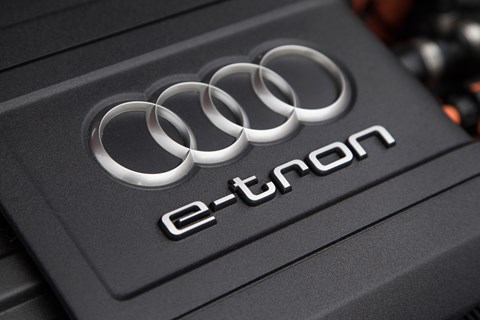► Three new electric Audis
► New e-tron SUV in 2018
► CNG development continues
Volkswagen may have stolen a march on premium sibling Audi with its range of plug-in vehicles, but Audi is set to join the lithium-power party in style with three electric vehicles by 2020.
First of these is what the company is simply referring to as ‘the e-tron’, arriving in 2018. This large SUV ‘marks a turning point for us,’ according to Rupert Stadler, chairman of Audi’s board of management. He goes further, describing this battery-electric 4×4 as ‘the first electric car with everyday usability’ – conveniently forgetting about the existence of Tesla.
More than 300 miles per charge
Helping to back up the usability claims are a range of more than 500km (around 310 miles) – the most rangy Tesla offers a potential 393 miles – while ‘a unique driving experience and a fantastic design’ together make the electric car a ‘must have’ for the coming decade, enthuses Stadler.
Following this in 2019 will be the e-tron Sportback – a fastback model with an elevated seating position – which Stadler describes as ‘not an SUV, but higher than a standard saloon.’
The third model comes in the form of a compact premium electric car in 2020. This is no rehashed A1, however. ‘Just electrifying an A1 would be somehow a little boring,’ states Dietmar Voggenreiter, Audi board of management member for sales and marketing.
Stand-out styling for electric Audis
‘That’s why we bring with the battery vehicle cars really new body shapes, because we have freedom without the big combustion engine at the front. We have more freedom for designing really interesting new cars. Very sporty cars,’ Voggenreiter continues.
Stadler anticipates ‘strong demand’ for pure electric cars between 2020 and 2023, with the company ready to respond by electrifying one model in each core Audi range from 2021. As with the company’s 2020 small EV, these won’t be clones of the brand’s sharp suited petrol and diesel models; ‘All electric cars from Audi will be clearly recognisable as such, with a progressive design,’ he adds.

Showing his ambitions for Audi’s e-tron range, Stadler predicts that, ‘by the middle of the next decade, every third Audi delivered to a customer will be either partially or fully electric.’ Meanwhile, Audi will also offer mild hybrids in each ‘core model series’ by 2025.
The charging network hasn’t been forgotten about either; with the VW Group, including Audi and Porsche pairing up with BMW, Daimler and Ford to ‘set up high-performance charging points with up to 350kW for fast charging when on long journeys on the main highway routes in Europe,’ according to Stadler. Whether this definition of Europe includes a Brexited UK, however, remains to be seen…
CNG an alternative for 80% less CO2 emissions
Audi isn’t betting the house on electric power, however. CNG – compressed natural gas – is one alternative already available in the A3 Sportback g-tron and A4 Avant g-tron guise that can cut CO2 emissions drastically according to Voggenreiter: ‘80% of CO2 of a normal combustion engine can be avoided with g-tron. We are the only ones to offer this technology on the market’, he states.
With synthetically produced ‘e-gas’ overall emissions could be even lower than that of an electric vehicle simply plugged into the mains, he adds. A3 and A4 versions have already been created and an A5 Sportback model is to come, and Audi is offering to cover the additional cost of filling up with e-gas for the first three years.
Claimed economy of 51.4-55.4mpg for the A3 and 43.5-52.3mpg for the A4 mean that they should consume a similar amount of fuel as economical petrol versions.
Hydrogen power being considered, too
Hydrogen tech is also being considered in Ingolstadt’s corridors of power. ‘Hydrogen as the energy source is the next major milestone on our electrification roadmap,’ says Stadler. ‘For customers who require cars with a very long range, the fuel cell will be a genuine alternative: lighter, quick to refuel and highly economical in the future.’
Audi Q7 e-tron plug-in hybrid review